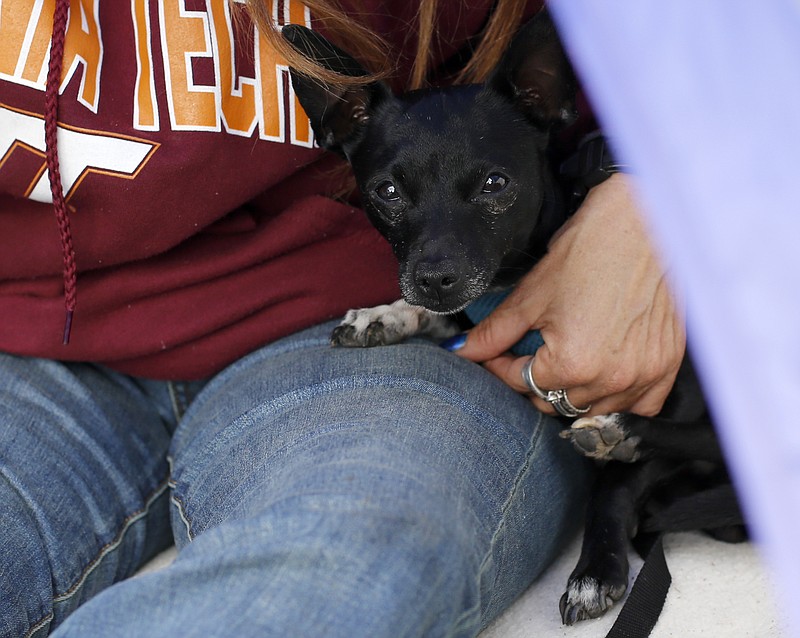Several blocks east of City Hall on East 11th Street, a homeless camp has been growing for months on contaminated city property.
City officials have acknowledged the empty field is convenient - a very short walk - to the Chattanooga Community Kitchen and Homeless Health Care Center, where a variety of support services are offered, but now have decided to move the residents off the property they say is still toxic after being used at one time as a city dump site for hazardous materials.
The nearby Community Kitchen operated an emergency shelter from Dec. 8, 2017, until March 11, 2018, but officials there have said its shelter is not adequate to house the number of homeless persons on any given night.
The homeless camp existed for almost all, if not all, of the time the shelter was open. It lies almost directly behind the Chattanooga Police Department's 11st Street Precinct.
So, for the better part of a half year, city employees have known a tent city was operating in a brownfield just a couple of stone's throws from the Chattanooga mayor's office. Perhaps the administration may have thought the individuals would be fine unless they disturbed the land. Perhaps the police may have thought the proximity to their precinct was the safest place the camp could be.
But why did they wait until the end of colder weather to do something about it?
What's also not easy to understand is that Mayor Andy Berke has been openly concerned with the homeless since he first ran for office in 2013. Indeed, he made an effort to end veteran homelessness an initiative in 2014 and received a letter from three federal government agencies last year confirming that the city has effectively ended veteran homelessness.
And only last month, the mayor signed an executive order forming an interagency council to work against homelessness.
"The No. 1 thing you can do for people with homelessness," Berke said, "is to get them into housing."
At the time, city officials said $500,000 to $1 million may be budgeted for the first year of the program.
Whether any of that money in the future might be offered to extend emergency shelter hours is unknown, but the city last week said it would allocate an estimated $15,000 to the Community Kitchen to reopen its cold-weather shelter for two weeks to facilitate the transition for people out of the homeless camp.
The shelter will reopen Friday. In the meantime, the Berke administration said it would coordinate with the Chattanooga Housing Authority and the Chattanooga Regional Homeless Coalition to help the campers find permanent housing.
All parties involved in homeless housing know the issue is a moving target. Some people very much want housing; others don't. Some are temporarily out of a home; others aren't interested in living in a home anytime soon. Some are here permanently; others are transient and want to be somewhere else in a few days.
Even before the tent camp began to form last fall - in fact, months before - a change came over the several blocks of 11th Street that house the Chattanooga Community Kitchen, Homeless Health Clinic, Maclellan Shelter for Families and other homeless support services. Grassy slopes off the street, doorways and stoops of abandoned buildings, packed cars and sidewalks became the homes, hangouts or nap spaces of many individuals.
And just as the city is "traffic-calming" Martin Luther King Boulevard, increasing the possibility for 11th Street to be a more widely used east-west route, 11th Street now daily has people slowly crossing back and forth, cars pulling into the support services center, fire engines and police cars arriving (1,400 calls last year alone to the street's 700 block) and children running to and fro.
The several-block area is a tragedy waiting to happen.
After the Community Kitchen shelter reopens Friday, area officials will have two weeks to deal with residents of the tent city, which the city's homeless program coordinator estimated was about 10 percent of area homeless individuals. In the meantime, we hope they look into the entire 11th Street corridor, the danger inherent in the two-block area and the adjacent unsafe areas in which many are spending their days (perhaps on ground just as toxic as the city property).
It's not difficult to have compassion for the homeless, especially those who are not homeless by choice. But it's equally compassionate to assure that they not be allowed to spend their days and nights in situations that might be more hazardous to their health than homelessness itself already is.
